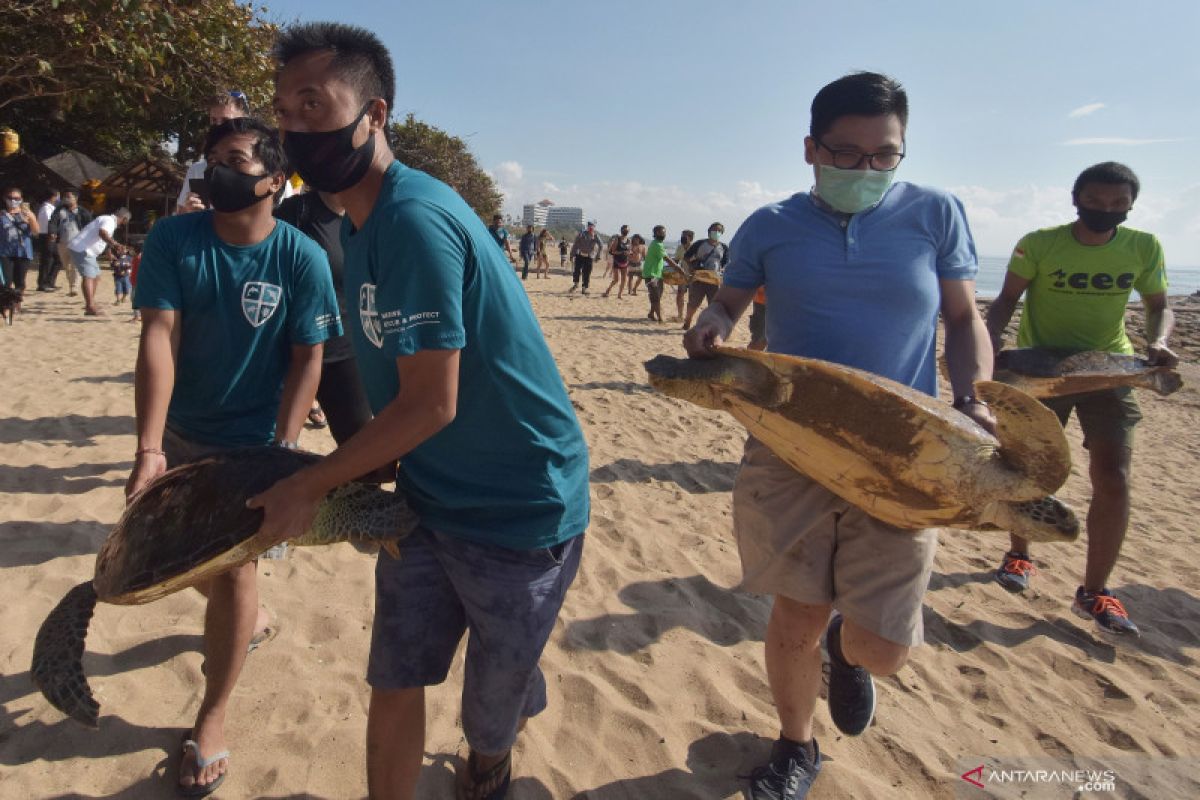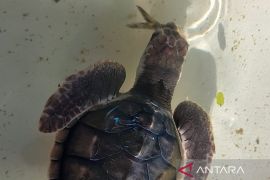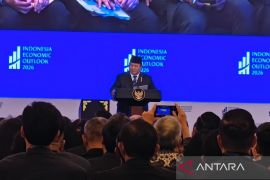I used to hunt turtles, but now, I play with them in the sea. Seeing the turtles swimming and eating naturally really touches my heartJakarta (ANTARA) - The habits of people of Enggano Island, a 400-square-kilometer island in Enggano District, Bengkulu Province, have partly changed.
In the past, the island’s villagers hunted green turtles (Chelonia mydas) that were used in preparing dishes for traditional events and weddings.
They cooked 10 to 30 green turtles, each weighing between 30 and 40 kilograms, for a traditional ceremony.
However, currently, the people of Enggano have begun switching from consuming the meat of green turtles to other sources of protein, such as beef.
Local fishermen, including Syamsul Anwar, 34, are slowly abandoning the habit of hunting turtles. Anwar had hunted green turtles since the age of 17.
Akin to other turtle hunters, Anwar sailed to the sea at night to make it easier to spot the white legs of turtles in the water. In the earlier days, he could catch a glimpse of at least 10 green turtles in four days.
The turtles caught by Anwar were not to be sold, but instead, were given for free to people, who held traditional ceremonies or celebrations. Anwar only received money for cigarettes and gasoline.
After some years passed by, Anwar stopped hunting turtles. He is now actively involved in activities to conserve the species.
“I used to hunt turtles, but now, I play with them in the sea. Seeing the turtles swimming and eating naturally really touches my heart,” Anwar stated in an interview with ANTARA in Malakoni Village of Enggano Island at the end of 2020.
Related news: Bengkulu residents give four turtle carrions to governor
Anwar then told ANTARA that the awareness of protecting the species came from his experience of raising a fist-sized baby turtle.
"I raised turtles for two years. They were never big but the same size. I then thought about the turtle weighing 30-40 kilograms that I had hunted and how long it took for it to grow that big," he stated.
Mulling over the life of green turtles made Anwar realize that the large sea turtles in the Cheloniidae family took a long time to grow. Their populations were prone to extinction if they were continuously hunted.
Anwar then immersed himself in conservation activities that comprised efforts to conserve turtles, protect coral reefs, and conduct reforestation of mangroves.
Since having stopped the hunting of green turtles, Anwar sometimes becomes a tour guide or accompanies traditional guests keen on knowing about Enggano Island.
The large number of immigrants, who built cattle and goat farms, as well as a decline in the green turtle population contributed to a shift in the habits of the people of Enggano.
Head of Malakoni Village Tedy Sunardi stated that before turtle hunting was rampant on Enggano Island, people could easily find turtles the size of a dining table.
However, currently, Sunardi noted that the largest turtle to be found was the size of a chair.
"The turtle population continues to decline, and it is feared to become extinct. Hence, youth activities are now focused on conservation," Sunardi expounded.
In a bid to support conservation efforts by youth groups, the village has allocated Rp10 million to Rp15 million (around US$713 to US$1.069) annually.
In a bid to protect the green turtle population, youth groups and villagers guard the turtle eggs, so that they can hatch safely on the beach. If they find turtles caught in nets, fishermen will attempt to release them even if they have to destroy their nets.
Changing habits
Sea turtles are one of the protected species based on the provisions of national and international laws, as these species are threatened with extinction owing to human activities.
Green turtles are categorized as endangered species and are included in Appendix I of the Convention on International Trade in Endangered Species of Wild Fauna and Flora (CITES).
The convention covers all wild plant and animal species that are prohibited in all forms of international trade.
However, green turtles are still being hunted---and changing the habit of turtle hunting is no easy task. It took academics and students at the University of Bengkulu a long time to persuade people accustomed to hunting turtles on Enggano Island to forego their habit.
Head of the Fisheries Laboratory for the Marine Science Study Program at the University of Bengkulu, Mukti Dono Wilopo, remarked that efforts to coax people into doing away with the habit were undertaken slowly during the 2014-2015 period.
"In 2014, my students and I conducted a coral transplantation activity in Enggano. However, I only got to know Anwar around 2015 when we had a field practicum activity," Wilopo recalled.
Wilopo recollected that Anwar was always involved in activities conducted on Enggano Island. Anwar's involvement then encouraged other fishermen to partake in conservation activities on Enggano Island.
In between these activities, Anwar and other fishermen, who were involved, received counseling on the preservation of protected animal species, such as green turtles.
"It took me five years to educate Anwar to stop hunting turtles," Wilopo noted.
He also explained that the university had conducted a study on the turtle meat consumption habits of Engganese people and found no provision on the consumption of turtle meat in the customary rules.
On the basis of the results of the study, counseling was conducted slowly to convince the people of Enggano Island to abandon the habit of hunting green turtles and consuming their meat. These efforts are expected to help in preserving the green turtle population on Enggano Island.
Related news: W Sumatra's Pieh Island declared sea mammal conservation area
Related news: Three turtles found dead off Pari island due to litter
Editor: Sri Haryati
Copyright © ANTARA 2021












